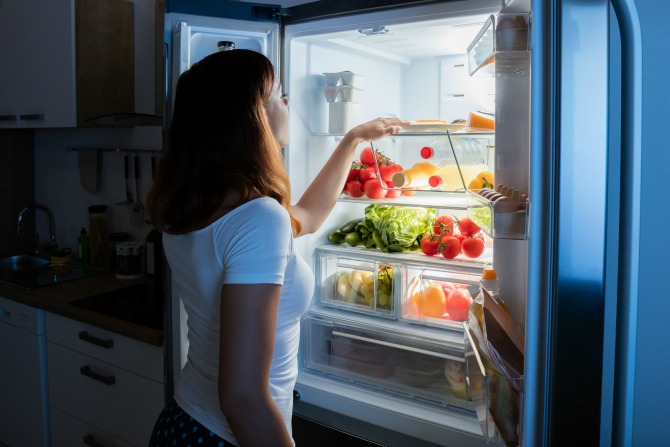The secret to good appetite control

Posted on
Someone asked me the other day: “Why do we need nutritionists/dietitians? Surely this stuff isn’t rocket science, we should know how to feed ourselves.”
It’s easy to think that knowing how to eat and maintain a healthy weight should be a natural and instinctive thing to do. I don’t deny the logic there.
From my experience, healthy eating does not come naturally to many people. Here’s why:
- Years of diet culture and mixed messages from the food industry has left us confused about what healthy food really is.
- We live in an environment saturated with highly palatable, energy-dense food that doesn’t give our body the tools to moderate our intake.
- We also associate food with many psychological and cultural aspects of our lives; boredom, stress, reward, and celebration.
Overeating is easy to do. Saying ‘no’ to delicious, yet not so healthy foods is hard to do.
If you’re one of those people who struggle with your food, don’t fret. There is hope!
When you start to make healthy food habits and routines a regular part of your life, you can stay in control of your food choices and achieve long-term health. Good appetite management is one of the best ways to help you make good choices.
Here are my seven keys to good appetite management:
Avoid restrictive diets
If you cut back on your food too much, your body will fight back, and you’ll feel extremely hungry most of the time. Combine this hunger with a stressful situation and an environment where unhelpful food is available, and you’ve got a recipe for overeating disaster.
Action point: Stop trying to follow restrictive eating patterns. If you can’t stick to it long term, it’s likely that it’s not realistic for you. Get individualised help so you’re eating correctly for your unique lifestyle.
Eat protein-rich foods
Protein is one of the nutrients that requires time for your body to digest and absorb. This means that a protein-rich meal helps you stay feeling fuller for longer. The presence of protein in your meal also means it takes longer to break down the carbohydrates as well, giving your body a slow, steady stream of energy in between meals.
Action point: Aim to include a protein-rich food for breakfast, lunch, and dinner.
Meet your daily fibre needs
Fibre is the indigestible portion of plant-based foods. Forget kombucha, a high fibre intake is hands down the best way to boost your gut bacteria and promote long-term metabolic and cardiovascular health. Fibre-rich foods will also fill you up quicker and keep you feeling fuller for longer as they bind to water and fat and slow down gastric emptying.
Action point: Include whole food sources of carbohydrates instead of processed ones. Good ones to start with: sweet potato, potato with skin on, 4 bean mix, chickpeas, lentils, brown rice, rye or grainy bread, corn on the cob.
Eat large meals
Yes, you read correctly. The larger your meal is, from a volume perspective, the fuller you will feel. But rather than filling up on high energy foods, fill half your dinner plate with non-starchy vegetables. They will make your meals large, with lower amounts of energy plus maximum nutrition!
Action point: Tally your daily vegetable intake. Be honest with yourself. If you’re not consistently hitting 5 cups of vegetables every day, put your effort into eating more of them! It’ll pay dividends with feeling more in control of your appetite through the day plus add heaps of extra benefits to your body’s health.
Stay hydrated
Hunger and thirst can sometimes get their wires crossed and you’ll feel hungry when you’re thirsty. A lot of our fluid intake comes through food, so it makes sense that our body may signal hunger when we’re becoming dehydrated. Generally speaking, thirst is not a good indicator of hydration. If you’re feeling excessively hungry throughout the day, it’s time to up your water intake.
Action point: Check the colour of your wee. It should be pale, clear yellow and you should go 4-5 times per day. If not, drink more.
Distract yourself from always thinking about food
Dieting and special food programs often leave you thinking about food ALL THE TIME. This constant obsessing often makes you feel hungrier and crave the foods that you told yourself you shouldn’t be eating. Take a step back from your weight loss or food goal and put it into perspective. Food isn’t the ‘be all and end all’ in life. It’s a tool to help you do life well. Make sure you set yourself other goals, non-food related ones. That way you’ve got other areas of your life to focus on!
Action point: Write down a list of activities that you can do to distract yourself from thinking about food. You can then refer to this list and pick an activity when the boredom or emotional eating trigger strikes.
Include your favourite foods in a mindful way
We all have foods that we love to eat. I love hot chips (fries) dipped in aioli. In fact, I friggin’ love aioli on pretty much everything. I know, however, that hot chips and aioli is not great to eat regularly, especially when I spend so much of my life sitting on my butt! I do, however, plan it into my diet and eat it mindfully. My favourite way to include it as my carb serve for a weekend meal. I serve up a ¼ plate of hot chips with a ¼ plate of scotch fillet, ½ a plate of salad and a little pot of aioli to dip! So yum!
Action point: Write down your all-time favourite foods. Think about how you can incorporate them into your life and still maintain a healthy eating pattern. If you need help, chat to a university qualified nutrition professional at The Healthy Eating Hub.


Leave a Reply
You must be logged in to post a comment.